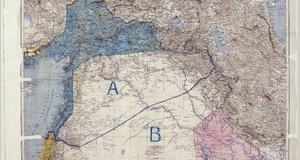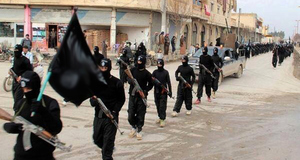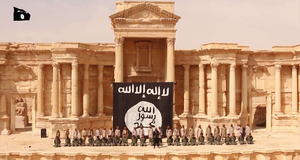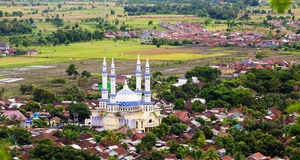Featured Article:The Islamic State Healthcare Paradox: A Caliphate in Crisis
By
2015, Vol. 7 No. 07 | pg. 3/3 | « Turning the Tide: Exploiting Existing Social Dynamics to Degrade and Destroy the CaliphateIn Inside Rebellion, Jeremy Weinstein argues that terrorist organizations face a core dilemma when they attempt to govern: they cannot attain their goals if they do not govern; yet, they repeatedly fail at governance efforts, exposing their greatest weaknesses (Ross and Magen). This feature of the IS caliphate is a vulnerability that Western nations and the coalition must exploit in order to win this war. Rather than prescribing solely military solutions to extremist problems, nations must carefully examine local resistance and social dynamics to amplify group resistance against IS control. IS’s narrative is not a new phenomenon in history. “One of the first groups to engage in anticolonial jihad and state-building was the fighters led by Abd al-Qadir, who challenged the French imperial invasion of North Africa in the 1830s and 1840s. Qadir declared himself “commander of the faithful” — the title of a caliph — and founded an Islamic state in western Algeria, with a capital in Mascara, a regular army and an administration that enforcedShariah lawand provided some public services (Motadel).” Likewise, the Mahdist state in Sudan, led by the self-proclaimed leader Muhammed Ahmad, called for Jihad while establishing state structures under a Sharia Law framework (Motadel). Both conflicts had a common theme with IS today: a caliph, a theoretically disciplined state, and a social service apparatus. They all believed in militant Islamism and denounced modernity and alternate faiths. Nevertheless, they were both completely destroyed by Western nations—France and Britain. Here’s why: “While jihadist networks or guerrilla groups are difficult to fight, a state, which can be invaded, is far easier to confront. And once there is a theocratic state, it often becomes clear that its rulers are incapable of providing sufficient social and political solutions, gradually alienating its subjects (Motadel).” Now, the question is how to find a solution. Many Muslims living under the caliphate’s rule regard IS as the only option for them, and thereby those individuals tacitly consent to the systematic oppression and brutality. An extensive research study involving over one million interviews across Iraq both before and after IS assumed control and Syria found that “the Islamic State is ideologically incompatible with the many of the residents of the territory it now occupies (Al-Dagher).” Unlike Hezbollah in Lebanon or Hamas in Palestine, which are sufficiently able to provide social services in areas that the government was unable to provide those same services (Al-Dagher), the Islamic State is widely disliked; survey results indicated that more than 90 percent of Sunni Muslims living under IS control view the Islamic State as a terrorist organization—not a state—and 80 percent of citizens support the international coalition effort to degrade and destroy IS (Al-Dagher).In 2007, the United States combined extensive military operations and social service provisions in order to oust Al Qaeda in Iraq from Anbar Province during the Awakening. “The silence of the population, of a substantial portion thereof, is critical for insurgencies. … For many years, the residents of Anbar governorate knew who the insurgents were but lacked either the will or violent capacity to resist them. American and Iraqi security forces had the combat power but not the required information [to defeat the insurgents] (Shaver and Tenorio).” Coupling social services with militarism created that necessary solution. In order to replicate those same results on a grander scale, it is crucial that the United States begins to shift its operations to rationalize IS as a state and not as a military entity with traditional terrorist goals. As the IS power dynamics shift with growing resilience among Sunni Muslims under IS-control, and as new outbreaks of disease and maltreatment of medical professionals is exacerbated by greater violence, Western powers can begin framing discourse under a light of health and humanitarianism coupled with military decision-making, for in the words of Sun Tzu, “The supreme art of war is to subdue the enemy without fighting.” ReferencesAbboud, M. (2014, August 19). ISIS militants threaten Mosul’s female doctors. Retrieved June 4, 2015. AID AND THE ISLAMIC STATE. (2014, December 1). IRIN/HPG Crisis Brief, pp. 1-5. Retrieved June 4, 2015. Alami, M. (2014, December 24). ISIS’s Governance Crisis (Part II): Social Services. Retrieved June 5, 2015. Al-Dagher, M. (2015, March 24). How Iraqi Sunnis really feel about the Islamic State. The Washington Post. Retrieved June 5, 2015. Al-Jadda, S. (2014, January 17). Syrian Healthcare System in Danger. Retrieved June 5, 2015. Al-Tamimi, A. (2015, January 20). Aspects of Islamic State (IS) Administration in Ninawa Province: Part II. Retrieved June 5, 2015. Arango, T., Salhy, S., Chivers, C., Hubbard, B., Nordland, R., & Rubin, A. (2014, September 16). How ISIS Works. The New York Times. Retrieved June 3, 2015, from http://www.nytimes.com/interactive/2014/09/16/world/middleeast/how-isis-works.html Bacchi, U., & Limam, A. (2015, April 24). Isis mimics Britain's NHS with 'Islamic State Health Service ISHS' International Business Times. Retrieved June 2, 2015, from http://www.ibtimes.co.uk/isis-mimics-britains-nhs-islamic-state-health-service-ishs-1498183 Barrett, R. (2014). The Islamic State (pp. 1-58). Barrett, R. (2014). The Soufan Group. The Islamic State (pp. 1-58). Bennhold, K. (2015, March 22). Medical Students From Britain Are Sought in Syria. The New York Times. Retrieved June 2, 2015, from http://nyti.ms/1xRyp2C Cunningham, E. (2014, November 25). Islamic State imposes a reign of fear in Iraqi hospitals. The Washington Post. Retrieved June 5, 2015. Cooper, C. (2015, January 15). Washington warns 'next Ebola' will strike in IS-controlled Iraq and Syria. The Independent. Retrieved June 5, 2015. Cunningham, E. (2014, November 25). Islamic State imposes a reign of fear in Iraqi hospitals. The Washington Post. Retrieved June 5, 2015. Cunningham, E. (2014, November 26). Islamic State group issues ultimatum to doctors. Retrieved June 4, 2015. Deutsche Welle. Documents reveal extensive bureaucratic structures in Islamic State. (2014, November 14). Retrieved June 5, 2015. Diab, K. (2014, July 2). The Caliphate Fantasy. The New York Times. Retrieved June 3, 2015, from http://nyti.ms/1qxqg3P Dreazen, Y. (2014, August 19). From electricity to sewage, U.S. intelligence says ISIS is fast learning how to run a country. Retrieved June 5, 2015. Fick, Maggie. U.N. Accuses Islamic State of Executions, Rape, Forced Child Recruitment in Iraq. (2014, July 18). The New York Times. Retrieved June 2, 2015, from http://nyti.ms/1ldAO18 Friedland, E. (2015). Special Report: The Islamic State. The Clarion Project. Gutman, R. (2015, February 11). In Recent Months, ISIS Targeted Hospitals, Doctors, Journalists. Retrieved June 4, 2015. Halevy, D., & Yasher, A. (2014, June 7). Islamic State Executes Female Doctors and Politicians. Retrieved June 4, 2015. Halevy, D., & Blank, C. (2014, December 18). Israel National News. Retrieved June 5, 2015. Hubbard, B., & Schmitt, E. (2014, August 27). Military Skill and Terrorist Technique Fuel Success of ISIS. The New York Times. Retrieved June 3, 2015, from http://nyti.ms/1tEDcVI ISIS fighters hit by deadly 'flesh-eating' disease. (2015, April 6). Al Arabiya News. Retrieved June 5, 2015, from http://english.alarabiya.net/en/perspective/features/2015/04/06/ISIS-fighters-hit-by-deadly-disease.html Islamic State Expands Its 'State' (2015, May 22). The New York Times. Retrieved June 2, 2015, from http://nyti.ms/1ekrSdH Islamic State releases video on new healthcare system. (2015, April 26). I24 News. Retrieved June 4, 2015, from http://www.i24news.tv/en/news/international/middle-east/69086-150426-islamic-state-releases-video-on-new- Johns Hopkins University. Syrian Medical Voices from the Ground: The Ordeal of Syria’s Healthcare Professionals. (2015). Retrieved June 4, 2015, from https://www.sams-usa.net/foundation/images/PDFs/Syrian Medical Voices from the Ground_F.pdf Kakutani, M. (2015, April 2). Review: ‘ISIS: The State of Terror,’ by Jessica Stern and J. M. Berger, and ‘ISIS: Inside the Army of Terror,’ by Michael Weiss and Hassan Hassan. The New York Times. Retrieved June 2, 2015, from http://nyti.ms/1DBweGT Lister, C. (2014). Proling the Islamic State. Foreign Policy at Brookings, 13. Retrieved June 4, 2015, from http://www.brookings.edu/~/media/Research/Files/Reports/2014/11/profiling-islamic-state-lister/en_web_lister.pdf?la=en MACFARLANE, M. (2015, April 2). ISIS in danger of being wiped out - by deadly flesh-eating disease. The Mirror. Retrieved June 5, 2015, from http://www.mirror.co.uk/news/world-news/isis-danger-being-wiped-out-5448779 Mahmood, M. (2015, February 17). Double-layered veils and despair … women describe life under Isis. Mecham, Q. (2015, February 5). How much of a state is the Islamic State? The Washington Post. Retrieved June 5, 2015. Motadel, D. (2014, September 23). The Ancestors of ISIS. The New York Times. Retrieved June 3, 2015, from http://www.nytimes.com/2014/09/24/opinion/the-ancestors-of-isis.html Physicians for Human Rights (PHR). Anatomy of a Crisis: A Map of Attacks on Health Care in Syria. (2015, April 1). PHR, pp. 1-3. Retrieved June 4, 2015, from https://s3.amazonaws.com/PHR_syria_map/findings.pdf Porter, T. (2014, November 14). International Business Times. Isis Kills Six Doctors for Refusing to Treat Wounded Militants in Mosul. Retrieved June 17, 2015. Reuters. Governments Should Talk to Islamic State to Get Aid Access: UNICEF. (2015, March 13). The New York Times. Retrieved June 2, 2015, from http://nyti.ms/1BI4Sug Ross, D., & Magen, A. (2014, July 18). The jihadist governance dilemma. The Washington Post. Retrieved June 5, 2015. Rudaw. ISIS executes more doctors in Mosul. (2014, December 28). Retrieved June 5, 2015. Shaver, A., & Tenorio, G. (2014, June 19). Want to defeat ISIS in Iraq? More electricity would help. The Washington Post. Retrieved June 5, 2015. Siegel-Itzkovich, J. (2015, April 6). ISIS militants reportedly being attacked by serious skin disease. The Jerusalem Post. Retrieved June 5, 2015. Sly, L. (2014, December 24). The Islamic State is failing at being a state. The Washington Post. Retrieved June 5, 2015. Snyder, B. (2015, April 25). Islamic State Health Service? ISIS launch British-inspired NHS. Retrieved June 4, 2015. Stewart, M. (2014). What’s so new about the Islamic State’s governance? (Vol. 9, pp. 32-33). Project on Middle East Political Science. Umaña, F. (2015). The Islamic State: More than a Terrorist Group? E-International Relations Students. Waugh, E. (n.d.). Religious Traditions and Healthcare Decisions. In The Islamic Tradition: Religious Beliefs and Healthcare Decisions. Wellen, R. (2014, June 25). The Two Faces of ISIS: Summary Executions and Planting Flowers. Foreign Policy ‘in Focus. Retrieved June 5, 2015. Wyke, T. (2015, April 24). Islamic State unveils the ISHS - its own version of Britain's NHS: Islamists promote new health service with poster campaign nearly identical to the UK's. DailyMail. Retrieved June 5, 2015. Zizek, S. (2014, September 3). ISIS Is a Disgrace to True Fundamentalism. The New York Times. Retrieved June 2, 2015, from http://nyti.ms/1qyIP5q Suggested Reading from Inquiries Journal
Inquiries Journal provides undergraduate and graduate students around the world a platform for the wide dissemination of academic work over a range of core disciplines. Representing the work of students from hundreds of institutions around the globe, Inquiries Journal's large database of academic articles is completely free. Learn more | Blog | Submit Latest in Political Science |


















